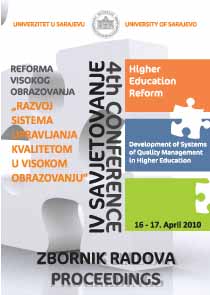Kvalitet akademskog obrazovanja – stub održivog razvoja
Academic Education Quality – Pillar of Sustainable Development
Author(s): Aleksandra NikolićSubject(s): Social Sciences
Published by: Univerzitet u Sarajevu
Keywords: quality of academic education; quality improvement; sustainable development
Summary/Abstract: Society development implies changes in ways how available resources are used, i.e. changes in ways of thinking, communication and actions of every member of the society. In other words, society development implies innovation of all socio-economic processes which should eventually result in better quality of life for each member of the society, as well as in the preservation and improvement of resources which the coming generations will inherit from us. New approaches, innovations cannot be obtained without knowledge, skills and capabilities acquired through the education process, especially the academic education process. Quality systems, constant quality improvements, allow universities to recognize the needs of the society and its sustainable development in an easier and simpler way. In other words, quality systems facilitate communication between the society and universities, which leads to quality improvement of all processes, as well as professional progress of all members of the academic community, thus making a real contribution to the development of the economy and the society as a whole. On the other hand, many researches, as well as everyday practice indicate that there is significant opposition to the introduction of quality systems at the university. This opposition stems from the fact that university staff see quality systems as instruments of tighter control and as something that has been imposed onto the academic community, something that will reduce the university to a “business with customers” and limit academic freedoms and creativity which represent the basis for creating new knowledge, skills and abilities, i.e. the basis on which the academic community can fulfill its purpose: making a full contribution to the development of the society. The goal of this paper is to initiate a broad debate at the university which should help clarify and provide a better understanding of the modern concept of quality as an instrument for improving the quality of every individual. We expect this debate to strengthen processes aimed at the establishment of consultative management which, we hope, will find a way to motivate university staff to participate in defining the “quality agenda” which will focus on making improvements and which will approach challenges set before the university by our environment in a specific way.
Journal: Zbornik radova - Univerzitet u Sarajevu
- Issue Year: 2010
- Issue No: 04
- Page Range: 367-377
- Page Count: 13
- Language: Bosnian

